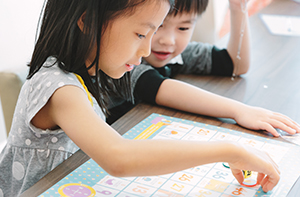Friendships are important for your child’s social and emotional development. For children who may be shy, making friends may not be easy.
Here’s how to help your child make friends in school and build meaningful relationships with peers.
Friendships are an important part of your child’s life in school. As your child finds others to socialise with in school, he or she is learning how to manage and respond to the thoughts, emotions and words of others.
At different ages, your child may need varying levels of support when making friends. We’ve collated 5 simple ways to help your child make friends in school.
Have an honest conversation with your child about what he or she thinks are some ideal qualities of a friend. Young children often gravitate to others who are similar to them. Guide him or her to realise that each person has unique likes and dislikes, opinions and habits.
Helping your child to know that characteristics like “kind” and “loves to share” are as important in a friend as “likes the same activities as I do”.
It’s important to let your child know that friendships are meant to be safe ‘spaces’ where relationships develop: that means that physical or emotional harm is a no-go, even in a friendship!
It also means that friends should respect each other’s personal space and property: asking for consent before giving a friend a hug or to borrow an item is still necessary.
Related Article: 3 Challenges Your Pre-school Child May Be Facing

Empower your child to realise that he or she has a lot of good to offer in the friendships he or she forges with others. Remind your child to extend kindness to others around him or her.
When dealing with a tricky emotional situation, encourage your child to consider the feelings and viewpoints of the other party before reacting or responding. Simply put, help your child know that he or she should exhibit the same positive qualities he or she expects from a friend.
As a parent, you can arrange for playdates that help your child build friendships in a safe and supervised environment. Having a safe environment means your child can build relationships with others and feel secure in your support.
By helping your child to socialise with his or her peers in an environment that is safe and familiar (i.e. at home, an often-visited park), your child will be more comfortable when sharing his or her ideas, thoughts and opinions.
Encourage your child to share about his or her friendships with you. As a parent, you can provide a valuable listening ear for your child as he or she navigates new friendships.
By sharing your own experiences in making, keeping and enriching friendships, your child can have a healthier and more realistic perspective on forming bonds with peers.
Classes are safe harbours for young learners at The Learning Lab.
Teachers guide your child as he or she learns to communicate his or her own ideas as well as to interact meaningfully with others in class. We believe in empowering your child to learn, create and achieve through lessons that are directly relevant to his or her learning needs.
We invite your child to join us in classes this term!
The Learning Lab is now at 8 locations. Find a location that suits your needs.
If you have any questions about our Early Years programmes, please email us at enquiry@thelearninglab.com.sg or call us at 6733 8711 and we will be happy to assist you.